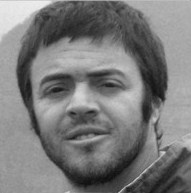 Matthew Gavin Frank is a contributor for Superstition Review’s Issue 7. In this interview, SR talks to Frank about work and his newest piece, The Morrow Plots.
Matthew Gavin Frank is a contributor for Superstition Review’s Issue 7. In this interview, SR talks to Frank about work and his newest piece, The Morrow Plots.
SR: After so much time spent in the food and wine industry, what inspired you to pursue degrees and careers in writing and poetry?
Matthew Gavin Frank: I loved writing well before I fell into the food and wine industries. I remember—I was about 10—going through my parents’ dresser drawers when they were otherwise occupied. I remember it as a Saturday. My dad was likely working. My mom was likely working-out: one of those Jane Fonda VHS tapes. In one drawer, I found a short essay she wrote about her own father’s death when she was 13. She spent her life teaching grammar—past participles and shit—to 7th graders, but, up until that point, I never knew she wrote. And, she never wrote anything again outside of letters to the editor. So stumbling onto that essay allowed me a richer engagement of my mother as a human being, I think.
Soon after that, I remember (this was 5th grade) collaborating with my friend Ryan Shpritz on a series of gross-out stories. A few years ago, when my wife and I were visiting my family in Chicago, my mom sat us down with these scrapbooks she made when my sister and I were toddlers. In the column that asked for my interests, she wrote, “Ghosts, blood, anything ghoulish.” Fucking blood. According to my own mother, one of my primary interests as a toddler was blood. So my later collaboration with Ryan, on this series of stories called “Death at Dark” (I, II, III, and so on) had its roots in those early interests. Mrs. Buccheim, our teacher—fabulous perm—allowed us to read our work in front of the class each week. She loved that we were writing extracurricularly. Once, in D at D part VI, I think, some poor sap caught his hand in a garbage disposal, and we compared the resulting carnage to a punctured egg yolk. Shannon Elliott, the cheerleader, cried. After that, Mrs. Buccheim, bless her proper heart, put a stop to our public readings. So, I then realized that writing not only had the power to reveal, but the power to get one banned.
This knowledge sort of fed all kinds of ideas about revolt, writerly and otherwise. Soon, I started thinking a lot about food. Growing up in a microwave-and-saturated-fat-centric family, it took me a while realize that the food world was larger than a radiated Lean Cuisine paired with Crystal Light pink lemonade. There was some impetuous revolt growing in me in my late teens in response to the crappy undergraduate meal-plan dinners (if you could call them that) served in Hopkins Hall, where I worked for a while—a very short while—clearing trays and washing dishes. I remember the particular dinner that inspired this culinary rebellion. It was this disaster of Creamed Chipped Beef on Texas Toast. It broke me. I began reading books on food and wine, determined to do better than this, which took a while actually. At some point, I came across an article on Barolo wine and vowed to go to the region where it was made. After a couple days, lazing in the vineyards, eating fresh pasta and white truffles, I vowed to return to live there and, upon returning to the States, trashed my microwave in vulgar ceremony. I thereafter took all sorts of restaurant jobs, and found a common thread: when chefs get together after work for drinks, and one chef asks me what I like to do in my spare time, and I say, “write poetry,” it’s ever a great conversation killer. Eventually, I realized I needed to chat about such things with some like-minded folks.
SR: I have heard some poets say that it is important for young writers to first go out into the world and experience life before writing about it and/or attempting to go into a MFA program. Others insist that the jump straight from undergraduate school to a MFA program is necessary. As someone who left home at age 17, experienced the world young, and returned to academia, what advice would you give to young writers?
MGF: I feel perfectly ill-equipped to give young writers lifestyle advice. There is no prescription for this shit. If you need and want to write, you will need and want to write, whether flipping eggs in an Alaskan diner for a living, or immersing oneself in academia. Folks are always talking about how MFA programs can be ruinous to burgeoning writers, who should first experience the world and gather stories; other folks insist that the training provided by the MFA is not a stylistic evening-out, but is essential to burgeoning writers and that it’s the outside world with its various bankrupt distractions that can be ruinous. So, everything can be ruinous, is the thesis, I think.
I tend to believe that these extremists are giving both the MFA program and the “world-at-large” too much credit. If you want and need to write, I’m not sure either choice has the power to strip that away and ruin you. Everything is situation-specific. The shunning of the academic construct in order to lead a vagabond lifestyle worked for me. That’s what I needed to do. I know incredible writers who never left academia—went straight from undergrad to MFA to PhD to a tenure-track position. That’s what they needed to do. I do think surrendering to whimsy is important, but such whimsy manifests itself in myriad ways for myriad people.
SR: I noticed that comments about your books by poets such as Norman Dubie and Cynthia Hogue are quoted on your website. Did you work with them during your time in the MFA program at ASU and if so how do you feel that they have influenced your writing?
MGF: Yeah, I worked with Norman and Cynthia, also Beckian, Jeannine, Alberto—all of whom were fabulous and influential. I love Norman’s poems for their drama, their characters, their social conscience, generosity of spirit, and their hilarity. I love watching the master of the dramatic monologue do his thing. I love how some of his poems combine the best of PBS’s Nova with the joy inherent in the telling of a fabulously bad joke. Norman once told me: “Dude, all my poems are jokes,” which is, of course, a joke, I think. This has inspired much of my own work. Wrapping joke in verse is hard, but so much fun. I can sense Norman’s joy in writing these poems as I read them. And every so often, Norman drops the veil, and steps, larger-than-life, center-stage. I love these moments, when he breaks the fourth wall. His poem, “Oration: Half-Moon in Vermont” is a great example of this. It ends:
In a year the owl will go on a shelf in the shed
Where in thirty years there will be a music box
Containing a lock of hair, her rosaries,
Her birth certificate,
And an impossibly sheer, salmon-pink scarf. What
I want to know of my government is
Doesn’t poverty just fucking break your heart?
Reading this for the first time, I felt like Ronnie Ballenger had just pulled the chair from beneath me at the junior high lunchroom table again, and Kelly Konopka laughed so hard milk came out her nose. I’m similarly disarmed and embarrassed, and delighted. As a poet, it seems Norman could not help himself here. There is a time for restraint in poetry, and a time when restraint should not be part of the poem’s language. Norman understands this. And the result is often an exhilarating, guilty pleasure. The line break after the “What” is essential to this effect, this surprise. In my own work, as a challenge, any time I try to pull off the presence of a booger, or something like it, that’s Norman’s influence.
Cynthia’s work taught me to stay in one place, poetically-speaking, for a while, to allow the poem to become itself. To keep looking at the thing again and again and again—to micro-examine the thing via various contexts and lenses, and then, just when you think you’ve got it, to turn away from the thing, to stare into the opposite direction, and then to describe what you see there. This sort of technique allowed me, in a thematically-linked book like The Morrow Plots especially, a fulcrum to which subsequent poems could attach like burrs, and spin.
SR: Was The Morrow Plots the original title for the poem? And if so, did it come naturally? What made you choose it as the title for the entire collection?
MGF: When I lived in Upstate New York—way up on the Canadian border—during the awful winter, I became obsessed with The Morrow Plots, an experimental cornfield on the University of Illinois-Urbana-Champaign campus. The local and campus agronomists conduct important crop experiments there, and then disseminate the findings among the U.S.’s farming industry. So, it’s an important square of land, and hallowed ground in downstate Illinois. You do not trespass on the Morrow Plots. The legal and social consequences for such things are dire. The Plots are regionally revered. Yeah: holy, even. I was born in Illinois, and I think I was oddly homesick for the Midwest all the way up there near Canada among the defunct Go-Kart tracks and Shining-esque hedge maze that my wife and I lived behind (the area was a bedroom community for Manhattanite boaters in the summer time, and so had all of these kitschy tourist traps that would go skeletal come winter). Upon researching old newspaper articles from the ’20s and ’30s, I found that the Plots were then known as a popular site for violent crime, or a dumping ground for bodies. And, if some mutilated remains went unclaimed, the University of Illinois would claim them for “experimental purposes.” And now, The Morrow Plots are a National Historical Landmark. So dealing with that discrepancy consumed me for a while. This is a great, if nauseating, way to sink into the comfort of the winter blues. But I was so glad to reemerge after that one. See some light after all the murder. I had to temper a lot of the darkness by reading Aimee Nezhukumatathil’s sumptuous At the Drive-in Volcano that winter. So yes, this obsession came naturally, and acted as that fulcrum on which I hung a bunch of murderous Midwestern things.
SR: In The Morrow Plots there is an enchanting set of lines that I am curious about. “…The book opening/to your knees/explodes with border scenes—/skeletal fish becoming women/with piñata faces.” The imagery and the musicality are beautiful. Where did your inspiration for these lines come from?
MGF: Firstly, thank you! When I was long ago an undergraduate at The University of Illinois, I used to sneak into Lincoln Hall at night. I was taking a Biology course from this guy George Kieffer—this wonderful old madman on the cusp of retirement who would run around his lecture stage, waving his hands and screaming about having found dead bodies in the nearby Boneyard Creek. He would triumphantly howl, to his teenage and twentysomething students, “You’re all headed toward Max S [the end stage of entropy], Max S! That’s when you’re dead!”
It was one of those buildings that had locked behind Plexiglas cases all sorts of wrinkled beasts pickled in jars of alcohol. I remember halls of fetal pigs, halls of snakes—both of which are good for poetry, of course.
So I would sneak in there at night, climb to the top floor, exit a window, and sit on the roof’s ledge overlooking the center of campus. Sections of the roof were made of copper and were beginning to green. I would often write up there, read up there by a pocket flashlight. From that vantage, The Morrow Plots were visible. I have this memory—fabricated or real, I can’t tell—of sitting up there, watching the stars or some other youthful romantic shit, with two books open on my lap: a biology textbook, and a glossy book of old Mexican movie posters. One book on each thigh. I’m trying to hold them both open, while also trying to not fall off the roof. The stars. The Plots. In the biology book, I remember some anatomical cross-section of a cod or something. In the second, an image of the second. Honestly, I don’t know if this is true or not, but this memory, when coupled with the violent history of The Morrow Plots, served to inspire this line, and this poem. The poem struggles, I think, to make all of these odd histories gel with the images that attend them. Struggles to deal with the ways in which height and distance both reveal and obscure. And how everything on earth is, of course, magnificent, terrible, and indistinct from a rooftop.
SR: Is there a particular poem or poet that first provided inspiration for your stylistic choices as a writer?
MGF: The poet Mike Madonick was the first poet who taught me that the muse occurs during the writing process, and not beforehand. That, to write a poem, in his words, is like, “[being] a dog let loose in a field, you pick up scents, another dog perhaps, a pheasant, or the quick motion of a grasshopper turns your head, and then your owner calls, you scramble back or you want to run or you just stand there and cock your head, look at him because you’re puzzled about the strange demand he’s put on you, as if he owned you.”
I was lucky enough to have Mike as a teacher, and am lucky enough to have him as a friend. I remember, as an undergrad, I declared a psychology major. Then, I took my very first poetry workshop with Mike, and he said something as simple as, “Poets are fucked-up people, generally,” and I rushed out of class and switched my major to Creative Writing, as if Madonick had given me some sort of permission to be my dumbass self, and to do the dumbass things I wanted to do.
SR: What advice do you have for writers with an interest in travelling and/or cuisine as subject matter for their work?
MGF: Don’t skimp tent-wise. Purchase one that decently blocks out the rain. This is your home for a while. Make it so. Create a little nightstand in the corner with a stack of books you plan on reading, and your notebook. Keep your watch, glasses and lantern on it, each in their own little spot.
Remember how when you were five, the optometrist told your mother in front of you that you’d be blind by age 30. Remember how you used to walk around your parents’ house at night, feeling your way in the darkness, practicing for blindness. Remember bumping into your dad’s collection of antique metal Coca-Cola trays. Remember the loudness. Finger your glasses on that makeshift nightstand in the tent—see in them, and your (however limited) retention of your sight, a lovely Fuck You to that optometrist’s version of fate. Contemplate fate, and other such nebulous things, no further. Go to sleep and dream about pasta.
If camping along the ski valley road in Taos, New Mexico, bring your own toilet paper, lest you want to succumb to the discarded Subway napkins the guy the next site over push-pinned to the pit toilet wall.
When camping in Kruger National Park in South Africa, listen at night to the hippos laughing. Take notes in vocables.
Camp at Wonder Lake in Alaska’s Denali National Park in mid-September. Wake up in the middle of the night to see the aurora borealis dancing pink and green over the mountain. Write a horrible poem about it. Revise it into a better poem, but realize it’s still horrible. Write a new poem. Put an oyster in it.
In a pinch, when preparing ramen noodles over a propane camp-stove, choose the pork flavor; boil the noodles in half-water, half-pineapple juice. Contemplate the illusory makeup of gourmet. Remember: ratio is everything. Two cans of Stagg Chili + one can of Libby’s Corned Beef Hash = tolerable high-calorie meal. One can of Stagg Chili + two cans of Corned Beef Hash = digestive demoralization from the throat on down—this is a ratio that may cause you to abandon your current course, flee the woods, get on the first plane to Paris, and have a vegetarian dinner at L’Arpege. After that, think differently about the tomato.
Meet your spouse in a Latin jazz bar on one island or another—one that you previously defined as fickle. Propose to her at Craters of the Moon National Monument in Idaho. Do this realizing that you are surrounded by nuclear test sites. Do this realizing that nearby Arco was the first town in the U.S. to be lit by atomic power. Do this realizing that you are camping on the rocks on which the astronauts practiced for moon landings.
No matter where you are, surrender to the street food, even though it will make you sick.
 Requiescat, Self-Portrayal at Samhain: Spiritisim is Annunciation, You Thought You Were An Opera Singer
Requiescat, Self-Portrayal at Samhain: Spiritisim is Annunciation, You Thought You Were An Opera Singer  Belief in the body is attempted, form found without words, form given. Leaving the mind starts out as a little joke. Here, Spiritism is a woman riding a colt; the space toward which she is moving is an immeasurable dark. How did you think things would improve? She gives night the permission to erase the host. Your architectures had always been enough, and perfectly therein.
Belief in the body is attempted, form found without words, form given. Leaving the mind starts out as a little joke. Here, Spiritism is a woman riding a colt; the space toward which she is moving is an immeasurable dark. How did you think things would improve? She gives night the permission to erase the host. Your architectures had always been enough, and perfectly therein. “An old lady poem,” was the judgment of a friend recently. I was offended, then considered—at 73, am I getting to be an old lady? How could that happen!
“An old lady poem,” was the judgment of a friend recently. I was offended, then considered—at 73, am I getting to be an old lady? How could that happen! Matthew Gavin Frank is a contributor for Superstition Review’s Issue 7. In this interview, SR talks to Frank about work and his newest piece, The Morrow Plots.
Matthew Gavin Frank is a contributor for Superstition Review’s Issue 7. In this interview, SR talks to Frank about work and his newest piece, The Morrow Plots.
